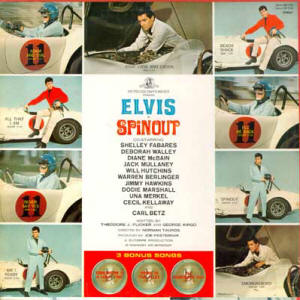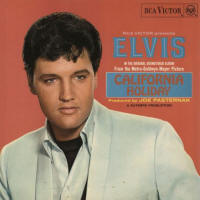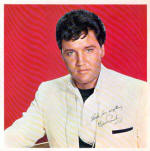

The final Presley album of 1966 was released
in October and once again was nothing but a
soundtrack. On the 29th of the month "Spinout"
entered the "Top LPs Chart", stayed for 32 weeks
and peaked at number 18. In its initial sales
period the long player sold 300,000 copies and
therefore performed much stronger than the
previous ones. But the audience soon lost
interest and so the global sales stagnated at
2.25 million units. Today this would equal 337.5
million streams for the complete album or 3.38
billion individual tracks.
In 2016 the complete Presley catalogue was
restored and remastered by Vic Anesini for a
boxed set of 60 compact discs called "The Album
Collection". Sony Music Entertainment provides
the streaming platforms with the same versions
of the individual albums (some of them offering
bonus tracks), albeit in 24 bit/90 khz flac.
That means, if the platform of your choice
supports high resolution audio, you can enjoy
the tracks in the same quality Sony used to scan
and master them. On Spotify, which has a market
share of approximately 30% and is the only
platform that publishes streaming figures,
"Spinout" accumulates 14 million streams
and generates >4,000 requests per day. So this
album is more than twice as popular as Elvis'
other soundtracks of this period, but it's
popularity on a very low level.
Because Elvis had gained weight in 1965 and
it was all too visible on the promo picures, his
manager and RCA had agreed to use older photos
for the record sleeves. But now the king had
slimed down somewhat and so current pics were
used again. Besides the movie tunes "Spinout"
also included three bonus songs. Therefore the
album was brought to a running time of 29:23
minutes. Because the word "Spinout" was not
common outside of the USA, the
movie and the
album were also sold as "California Holiday".

To push the sales, RCA Victor included a
special photo card on the first edition of the
long player. All other pressings were delivered
without the bonus.

In 2004 Follow That Dream Records released a
collector's edition of "Spinout", that also
included several outtakes. You can read the
review by tapping
HERE.
The recordings were done on February 16th and
17th, 1966 at Radio Recorders in
Hollywood/California. The sessions were produced
by George Stoll, the engineering was done by
Dave Wichman. Elvis was accompanied by Scotty
Moore (guitar), D.J. Fontana (drums), Tommy
Tedesco (guitar), Hilmer J. Timbrell (guitar),
Bob Moore (bass), Murrey Harmann (drums), Floyd
Cramer (piano and organ), Homer Randolph
(saxophone) and Charlie Hodge (piano on "Beach
Shack"). The harmonies were provided by The
Jordanaires (Gordon Stoker, Ray Walker, Hoyt
Hawkings and Neal Matthews).
Stop, Look And ListenThe
album starts with a song, that is somewhat
reminiscent of the good old rock'n'roll, but
also includes (by the mid-sixties of the past
century) modern instruments like an organ and a
harder played electric guitar. The singer
repeats the advice of his father: Whenever you
see a beautiful woman, stop, look and listen or
you'll get in trouble. The song is ok for a
movie, but it certainly wouldn't have made it on
any of Elvis' regular albums. It didn't even
make it on the "Girl Happy" soundtrack, because
it had already been suggested to the king, but
was refused. His publisher gave it to Rick
Nelson (1964) and Bill Haley (1965) and finally
once more to Elvis Presley. And so he recorded
seven takes of "Stop, Look And Listen" on
February 16, 1966. The master is basically the
seventh attempt, but with the drum-intro of take
6.
Adam And Evil
Once again we get an uptempo popsong, that
certainly doesn't belong to the bad movie tunes,
but it isn't a highlight either. The singer
ascertaines,
that women are the root of all evil, but he
loves them nevertheless. Elvis recorded "Adam
And Evil" on February 17, 1966 within 20 takes.
By the way, the song was written by Fred Wise
and Randy Starr.
All That I Am
The ballad was also the b-side of the single
"Spinout" and reached number 41 on the "Hot
100". In Great Britain the song by Sid Tepper
and Roy C. Bennett even made it to number 18 of
the charts. Elvis needed five takes to record
the track on February 17, 1966. On July 14th
further instruments were recorded at the MGM
Soundstage in Hollywood/California. This session
was produced by George Stoll and engineered by
Aaron Rochin and Lyle Burbridge. To me "All That
I Am" is solid easy listening.
Never Say Yes
This uptempo song was written by Doc Pomus and
Mort Shuman. They didn't even get close to "A
Mess Of Blues", "Little Sister" or "Viva Las
Vegas", but it could have been a lot worse.
According to the singer his secret of success
with women is always to suggest to say "yes",
but never to do it. For quite a while "Never Say
Yes" was supposed to be the title of the movie,
but finally the flick was named "Spinout". On
February 17, 1966 Elvis recorded six takes of
the song, the master was spliced of take 6 and
the ending of take 5.
Am I Ready
Anno 1910 Victor Herbert & His Orchestra
performed the operetta "When Sweet Sixteen" for
the first time. The stage play included a song
named "To A Wild Rose", which was released by
Herbert on a record the same year. Half a
century later Sid Tepper and Roy C. Bennett
turned the ballad into "Am I Ready" and Elvis
recorded it on February 16, 1966 within seven
takes. To me "Am I Ready" is one of the
highlights of this album. CAMDEN used the track
in 1972 on the album "Burning Love And Hits From
His Movies".
Beach Shack
This somewhat empty-headed song was written by
Bill Giant, Bernie Baum and Florence Kaye. The
singer wants to convince a lady to follow him
into his beach shack and...well...have a beach
shag. On February 16, 1966 Elvis recorded four
takes of the tune.
SpinoutThe second side of
the longplayer starts with the title song of the
movie, which had been released previously by RCA Victor on
a single, coupled with "All That I Am". It
didn't become a hit and never made it past
number 40 of the Billboard Charts. The writers,
Sid Wayne, Ben Wisman and Dolores Fuller,
compare a releationship to a car race and
advice to spin out (escape). The king recorded
"Spinout" on February 17, 1966 and needed five
takes to archive a satisfactory result. To give
the by now outdated movie tunes a modern touch,
once again an organ (one of the hot instruments
of the 1960s) was added.
Smorgasbord
Here the singer compares the many ladies in the
world to a buffet, in Sweden called
"Smorgasbord". From today's point of view this
perspective might be a tad on the chauvinist
side, but in general it's a nice, happy popsong.
It was written b Sid Tepper and Roy C. Bennet,
on February 16, 1966 Elvis recorded
"Smorgasbord" within seven takes.
I'll Be Back
At the end of the movie Mike (Elvis) anticipates
"The Terminator" and promises "I'll Be Back".
It's certainly one of the better movie tunes,
Elvis recorded it it on February 17, 1966 in a
single take. "I'll Be Back" was written by Sid
Wayne and Ben Wiseman.
Tomorrow Is A Long Time
(bonus song)
Because nine songs were not enough to fill an
album, RCA Victor extended it with three bonus
songs. The first of them was recorded on May 25,
1966 at RCA Studio B in Nashville/Tennessee. Bob
Dylan's "Tomorrow Is A Long Time" had originally
been released by Ian & Silvia, but Elvis was
obviously inspired by the version of Odetta
Holmes on the album "Odetta Sings Dylan". To me
this track is the highlight of the album and
it's a pity, that nobody had the idea to release
it on a single. However, when Bob Dylan was
asked what his favorite cover version of his
songs was, he named this very recording.
Down In The Alley
(bonus song)
With this song Elvis covered a tune from his
youth. Jesse Stone's "Down In The Alley" had
been released by The Clovers in 1953, when Mr.
Presley was 18 years old. On Mai 25, 1966 the
king recorded nine takes of the song and one can
hear how much fun he had. In the song the
narrator makes no secret of what he wants from
his girl, something that never happened in the
well-behaved movie tunes. "Down In The Alley"
was also played live, even though it was just
once. The king presented the song on August 19,
1974 on the opening night of his "Elvis Summer
Festival" at the Las Vegas Hilton.
I'll Remember You
(bonus song)
The album closes with a ballad written by
Kuiokalani Lee. The first release was in 1965 by
Don Ho, later it was also recorded by Andy
Williams and Lee himself. The rhythm track of
Elvis' version was recorded on June 10, 1966,
the vocal track followed two days later. The
master is a combination of take 1 (rhythm track)
and take 3 (vocal track). Between 1972 and 1976
"I'll Remember You" was also featured in many
concerts of the king. One of these live versions
was released on the double album "Aloha From
Hawaii Via Satellite" (1973).
Verdict
By 1966 Elvis' music sounded somewhat
outdated and "Spinout" is an obvious attempt
to modernize it. There were organs, harder
played electric guitars and even strings.
The man himself also sounded more commited
than on his previous releases. However, the
king's voice is still too loud in the mix
and the instruments and harmony voices are
given too little space. In total the
movie tunes are ok, but the bonus songs
proved what Elvis really could do and how
the whole album could have been.

(C) RCA Records
![]()



